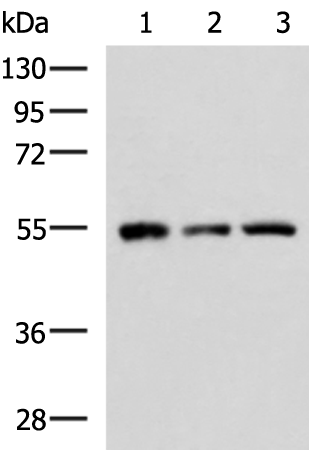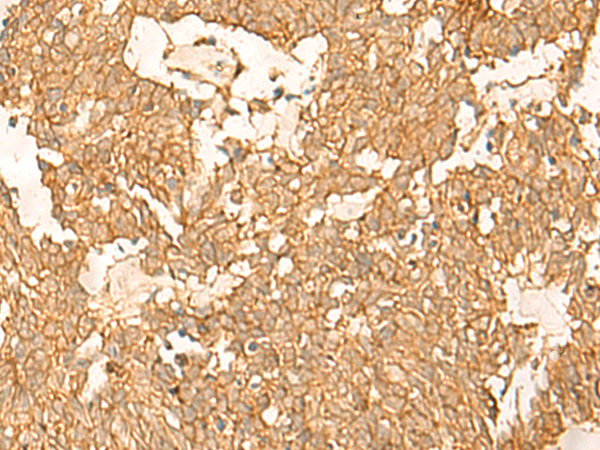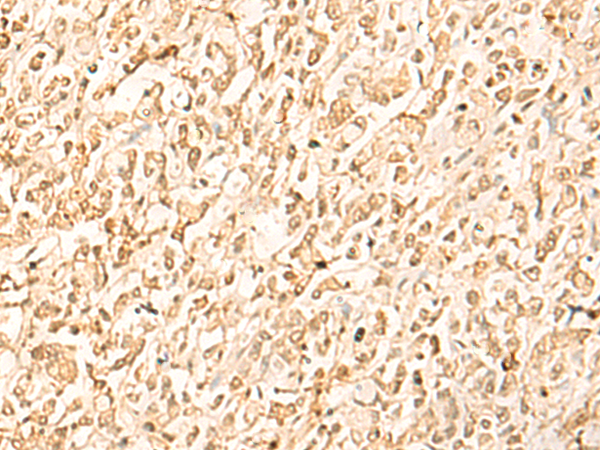


| WB | 咨询技术 | Human,Mouse,Rat |
| IF | 咨询技术 | Human,Mouse,Rat |
| IHC | 1/30-1/150 | Human,Mouse,Rat |
| ICC | 技术咨询 | Human,Mouse,Rat |
| FCM | 咨询技术 | Human,Mouse,Rat |
| Elisa | 1/5000-1/10000 | Human,Mouse,Rat |
| WB Predicted band size | 46 kDa |
| Host/Isotype | Rabbit IgG |
| Antibody Type | Primary antibody |
| Storage | Store at 4°C short term. Aliquot and store at -20°C long term. Avoid freeze/thaw cycles. |
| Species Reactivity | Human |
| Immunogen | Synthetic peptide of human RAD52 |
| Formulation | Purified antibody in PBS with 0.05% sodium azide and 50% glycerol. |
+ +
以下是3篇关于RAD52抗体的参考文献概览(基于公开信息模拟,仅供参考):
---
1. **文献名称**:*RAD52 Facilitates Homologous Recombination in BRCA1/2-Deficient Cancers*
**作者**:Lok, B. H., et al.
**摘要**:该研究利用RAD52抗体进行免疫印迹和免疫荧光实验,发现BRCA1/2缺陷的癌细胞依赖RAD52介导的同源重组修复(HR)。抑制RAD52可选择性杀死此类癌细胞,提示其作为合成致死疗法的靶点。
---
2. **文献名称**:*RAD52 Antibody Reveals Critical Role in CRISPR/Cas9 Genome Editing*
**作者**:Stark, J. M., et al.
**摘要**:通过RAD52抗体敲低实验,证明RAD52在CRISPR/Cas9诱导的DNA双链断裂修复中促进微同源介导的末端连接(MMEJ)。研究为基因编辑效率优化提供了机制依据。
---
3. **文献名称**:*Targeting RAD52 for Cancer Therapy Using Small-Molecule Inhibitors*
**作者**:Huang, F., et al.
**摘要**:结合RAD52抗体验证小分子抑制剂对RAD52蛋白复合物的破坏作用,显示抑制RAD52可阻断同源配对活性,增强放疗/化疗对多种实体瘤的敏感性。
---
如需具体文献,建议通过PubMed或Google Scholar搜索标题关键词获取原文。
The RAD52 antibody is a crucial tool in studying the RAD52 protein, a key player in DNA repair and genome maintenance. RAD52 facilitates homologous recombination (HR) and single-strand annealing (SSA), critical pathways for repairing DNA double-strand breaks (DSBs). It binds single-stranded DNA (ssDNA), promoting strand pairing and exchange during HR, and stabilizes DNA intermediates. In yeast, RAD52 is essential for HR, but in mammals, its role is partially supplanted by BRCA1/2 proteins, though it remains vital in backup repair mechanisms, particularly in BRCA-deficient cancers.
Researchers use RAD52 antibodies to detect protein expression, localization, and interactions in various experimental models, including human, mouse, and yeast cells. These antibodies are employed in techniques like Western blotting, immunofluorescence, and chromatin immunoprecipitation (ChIP) to investigate RAD52's dynamics during DNA damage responses. Elevated RAD52 levels are observed in certain cancers, linking it to genomic instability and therapeutic resistance. Inhibiting RAD52 is explored as a strategy to target BRCA-mutant tumors, exploiting synthetic lethality.
The antibody's specificity and validation (e.g., knockout controls) are critical for accurate data interpretation. Studying RAD52 also sheds light on replication stress, telomere maintenance, and viral integration mechanisms. Overall, RAD52 antibodies are indispensable for unraveling DNA repair pathways and their implications in cancer biology and treatment.
×